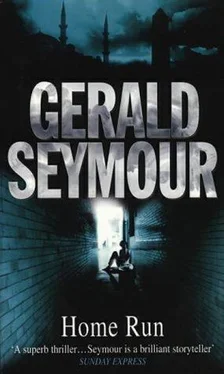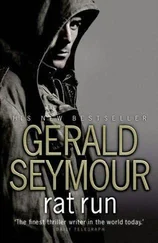Gerald Seymour - Home Run
Здесь есть возможность читать онлайн «Gerald Seymour - Home Run» весь текст электронной книги совершенно бесплатно (целиком полную версию без сокращений). В некоторых случаях можно слушать аудио, скачать через торрент в формате fb2 и присутствует краткое содержание. Жанр: Триллер, на английском языке. Описание произведения, (предисловие) а так же отзывы посетителей доступны на портале библиотеки ЛибКат.
- Название:Home Run
- Автор:
- Жанр:
- Год:неизвестен
- ISBN:нет данных
- Рейтинг книги:5 / 5. Голосов: 1
-
Избранное:Добавить в избранное
- Отзывы:
-
Ваша оценка:
- 100
- 1
- 2
- 3
- 4
- 5
Home Run: краткое содержание, описание и аннотация
Предлагаем к чтению аннотацию, описание, краткое содержание или предисловие (зависит от того, что написал сам автор книги «Home Run»). Если вы не нашли необходимую информацию о книге — напишите в комментариях, мы постараемся отыскать её.
Home Run — читать онлайн бесплатно полную книгу (весь текст) целиком
Ниже представлен текст книги, разбитый по страницам. Система сохранения места последней прочитанной страницы, позволяет с удобством читать онлайн бесплатно книгу «Home Run», без необходимости каждый раз заново искать на чём Вы остановились. Поставьте закладку, и сможете в любой момент перейти на страницу, на которой закончили чтение.
Интервал:
Закладка:
"Excellent. The Iranians believe, quite literally, they can get away with murder these days. I think the Pentagon taught the Libyans a lesson, and we have done the same to the Syrians. They're both better mannered now. In my opinion, it's time the Iranians were given a short sharp shock of their own… Why don't you stay and have a bite of lunch here?"
In Bahrain, Mattie had met the carpet merchant from Tehran.
The man brought in foreign exchange, and his family were left behind, and he had two sons conscripted, so he could usually get a visa to fly out and back. And in Bahrain he had talked with his Station Officer. And he had picked up a tail.
Mattie had flown from Bahrain to Dubai to see the junior in place there, and he had been watched on to the aircraft and watched off it. He had dealt with the junior in a bit over four hours, given him the pep talk, told him to chuck out his University essay style, and to get himself down to the docks more often, to ingratiate himself more with the shipping fraternity.
Had he taken the road from Dubai to Abu Dhabi, had he been driven the hundred miles from Dubai to Abu Dhabi, past the cars left to rust in the desert because the oil rich could not be bothered to fix another starter motor or whatever, then he might have noticed the tail. Travelling by air, watched through an airport, watched out of an airport, he did not see the tails.
And little opportunity here in the Gulf for him to lay a trail as an archaeologist. He found these communities with their air-conditioned Hiltons, their chilled ice rinks that were proofed against the 100 degree outside temperature, their communities of tax-avoiding British engineers, rather tedious.
Van would be different, the Urartian ruins would be blissful.
He lost the tail that he did not know he had picked up in Abu Dhabi. He employed his standard procedures. He had checked into the hotel, been given a room on the 20th floor of an architectural monstrosity, and then slipped down the fire escape service staircase and out through the work force entrance. He had entered the hotel wearing his dun-coloured linen suit, left it in jeans and a sweatshirt. And he sweated hugely as he walked the few hundred paces through the city to the small office that was nominally base for a firm of international marine surveyors. In a first floor room, the Venetian blinds down, he met the man who worked in the Harbourmaster's office in the Iranian port of Bandar Abbas.
Mattie had to hug the man. That, also, was standard procedure. He was not fond of overt displays of affection, but it was the way of these things that a man who had come secretly by dhow across the waters of the Gulf must be hugged like a prodigal returned. The man kissed him on both cheeks, and Mattie could smell the man's last meal. It must not concern Mattie Furniss, Head of the Iran Desk, that the man had perspired his fear of discovery while lying amongst the nets and hawsers of a dhow that had ferried him from Bandar Abbas to the wharfs of Abu Dhabi. If the dhow had been hoarded, if the man had been discovered by the Guards, if the man had been taken before a Revolutionary Court, then the man would have been tortured, would have screamed for the release of execution. And yet Mattie must, as a pro-lessional, keep himself emotionally aloof.
They sat down. They sipped tea. The man listened, and Mat tie gave him the prepared lecture.
"It is detail that we want. Hard facts… I don't just want to know that a Portugese or Swedish or Cypriot registered ship is coming in to Bandar Abbas with containers on the deck, I can get all that from satellite photography. I want the contents of the containers. I want the markings on the containers…"
He watched the man, saw that his fingers were twitching at the string of beads that he held over his lap. If over the years he had become emotionally involved with the man then he would have found these demands well nigh impossible to make.
"… There is an international arms embargo on Iran. No weapons of war are supposed to be shipped into Bandar Abbas or any other port of entry, yet we understand that the Iranians are spending 250 million dollars a month on hardware. We want your country, your regime, strangled of arms supplies.
Without the arms supplies the war effort will fail, and if the war effort fails then the clerics are gone. That's the incentive for you."
Not, of course, for Mattie Furniss to share with an agent Century's exasperation at the government of the United States of America who had dispatched 2,086 tube-launched optically-tracked wire-guided missiles to the clerics along with a plane-load of spares for their old F – 4 Phantoms. He could have reeled off the roll of honour of countries shipping arms to Iran: USSR, China, UK (anything from anti-aircraft radar to military explosives), Italy, Spain, Greece, North and South Korea, Taiwan, Pakistan, Syria, Libya, the Czechs, the East Germans, the Japanese, Brazil, Argentina, the Netherlands, Israel, Portugal, Belgium, even the Saudis… Where a buck was to be made…
"… Fine, we know that they are steadily turning to home produced weaponry, but for the moment it is not sophisticated enough for modern warfare, and must be backed up by essential spares for items such as strike aircraft – that's what we have to know about. Don't shake your head, you can walk on water when you set your mind to it. Any arms shipment is going to be met with security, with military vehicles, it's going straight through the Customs checks, no formalities.
Those are the ones that we have to know about… "
Those who knew Mattie Furniss down in the Cotswolds, the other weekenders in Bibury, the cocktail set of Saturday evenings, would have described him as a very straight sort of cove, a pretty gentle sort of fellow. Those who talked to him about footpaths, and milk yields, and the Stock Market, would have been upended to have known that he would drive a volunteer, a very brave spy, to suicidal risks, and seem to think nothing of it. He was a hard man. He was a Desk head in Century.
The following morning, while the official from the Harbour- master's office was returning to Bandar Abbas, once more secreted in a dhow, Mattie was watched as he boarded the flight to Ankara, the capital city of Turkey.
He was missing four front teeth, and the rest were yellowed stumps. The old man's hair was tangled, uncared for. His lined face was the colour of a walnut. It was a tough life that he lived on the lower slopes of the mountain. He ran some hardy goats and some thick coated sheep on the side of the Iri Dagh mountain and in the shadow of the summit, always snow capped, that rose to 8,800 feet above the level of the distant sea. On a clear day, and in the early morning when the sun was rising behind the mountain, it was possible for the old man to look down on to the metropolis of Tabriz. His glance would be cursory. He had no interest in that city.
He was steeled by the roughness of the ground on which his livestock grazed, on which he grew vegetables close to his stone-walled, tin-roofed home, and he was tempered by the sadness of his old age.
Majid Nazeri closed the wooden plank door and walked towards the building where the animals wintered and where he stored their fodder. He walked like an old soldier. He had no part of the present world which was why he was happy to live in this isolation, alone with his dogs on the slopes of Iri Dagh, away from Tabriz which the regime had made their own.
He inserted into the padlock the key that hung from a leather thong around his neck. There was a cut of pain on his face, because the new shoes that he had been bought would take weeks to mould their soles around the misshapen outlines of his feet. He was not ungrateful for having been bought the shoes, but it would be the next winter before they were comfortable for him. The nearest habitation was the village of Elehred, away over the mountain to the north, towards the Soviet border. He had chosen to spend his last days in a wilderness that housed the free soaring eagles, and the ravaging wolf packs, and the leopard if he was lucky enough to see it and his body smell were not carried on the stiff winds that never forsook the slopes of Iri Dagh.
Читать дальшеИнтервал:
Закладка:
Похожие книги на «Home Run»
Представляем Вашему вниманию похожие книги на «Home Run» списком для выбора. Мы отобрали схожую по названию и смыслу литературу в надежде предоставить читателям больше вариантов отыскать новые, интересные, ещё непрочитанные произведения.
Обсуждение, отзывы о книге «Home Run» и просто собственные мнения читателей. Оставьте ваши комментарии, напишите, что Вы думаете о произведении, его смысле или главных героях. Укажите что конкретно понравилось, а что нет, и почему Вы так считаете.












